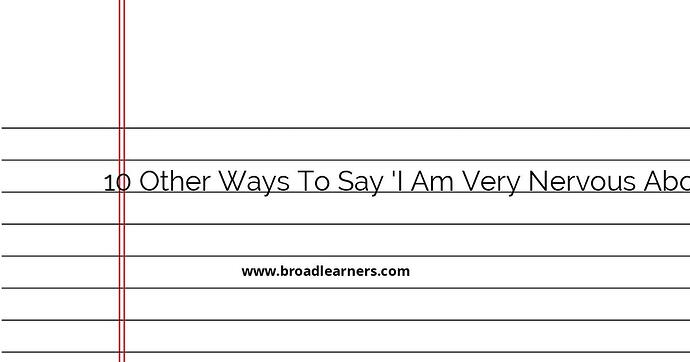Feeling nervous about something is completely normal, but expressing it in different ways can add variety to your conversations. Instead of always saying, “I am very nervous about this,” try using one of these alternative phrases:
- I am feeling extremely anxious about this
- I am quite apprehensive about this
- This is making me feel really jittery
- I am feeling on edge about this
- I am experiencing a lot of butterflies in my stomach about this
- I am really worried about this
- I am feeling extremely uneasy about this
- This is causing me a great deal of anxiety
- I am feeling really stressed out about this
- This is making me really uncomfortable
Let's take a closer look at each alternative phrase and provide examples for more clarity:
1. I am feeling extremely anxious about this
When you're feeling very nervous, you can use the phrase, “I am feeling extremely anxious about this.” This conveys a stronger sense of unease and worry in your statement.
Example: I am feeling extremely anxious about the upcoming presentation. I've been practicing, but I'm still worried about speaking in front of a large audience.
2. I am quite apprehensive about this
When you have some concerns or doubts and want to express your nervousness, saying, “I am quite apprehensive about this” is a good choice. It indicates that you have reservations or a sense of caution.
Example: I am quite apprehensive about going on a blind date. I don't know what to expect, and it's making me nervous.
3. This is making me feel really jittery
If something is making you feel restless or unable to stay calm, you can say, “This is making me feel really jittery.” It suggests a sense of nervous energy or unease.
Example: The thought of flying for the first time is making me feel really jittery. I'm worried about turbulence and not being in control.
4. I am feeling on edge about this
When you're feeling tense, uneasy, or like you're constantly on alert, saying, “I am feeling on edge about this” is an ideal way to express your nervousness.
Example: The suspense before the final exam is making me feel on edge. I've studied hard, but I'm still worried about whether I'll pass.
5. I am experiencing a lot of butterflies in my stomach about this
If you have a fluttery or queasy feeling in your stomach due to nervousness, you can say, “I am experiencing a lot of butterflies in my stomach about this.” It vividly describes the physical sensation of nervousness.
Example: Going on stage to perform always gives me a lot of butterflies in my stomach. I hope I can remember all my lines.
6. I am really worried about this
When you have deep concerns and feel troubled, saying, “I am really worried about this” expresses your nervousness with clarity.
Example: I am really worried about moving to a new city. I don't know anyone there, and I'm afraid I won't fit in.
7. I am feeling extremely uneasy about this
If something is making you feel uncomfortable or agitated, you can say, “I am feeling extremely uneasy about this.” It signifies a strong sense of discomfort.
Example: I am feeling extremely uneasy about taking a test tomorrow. I didn't have enough time to study, and I'm afraid I'll fail.
8. This is causing me a great deal of anxiety
When something is causing you a significant amount of worry or stress, saying, “This is causing me a great deal of anxiety” expresses your nervousness and emphasizes its impact on you.
Example: The upcoming job interview is causing me a great deal of anxiety. I really want the position and I'm afraid of messing up.
9. I am feeling really stressed out about this
When something is making you feel overwhelmed or under pressure, saying, “I am feeling really stressed out about this” highlights the mental toll of your nervousness.
Example: The deadline for this project is approaching, and I am feeling really stressed out about it. I want to ensure it's done perfectly.
10. This is making me really uncomfortable
If something is making you feel uneasy or awkward, saying, “This is making me really uncomfortable” conveys your nervousness while emphasizing your discomfort.
Example: Being in large social gatherings always makes me feel really uncomfortable. I prefer smaller, more intimate settings.
By using these alternative phrases, you can effectively communicate your nervousness in a variety of situations. Remember to choose the phrase that best reflects your level of nervousness and the context of the situation.
Did I miss anything? Respond below
